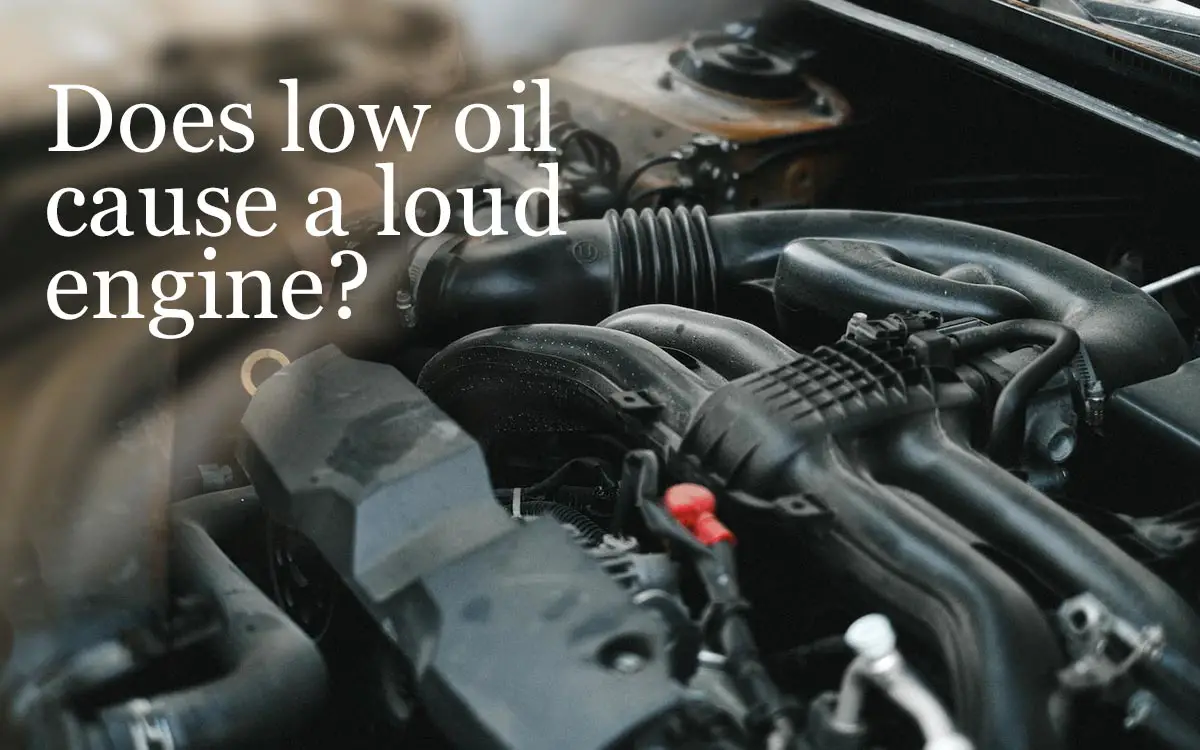Have you ever been driving down the road, enjoying the wind in your hair and the open road ahead, when suddenly your peaceful drive is interrupted by a loud, unsettling noise coming from under the hood? You feel a pit in your stomach, a sinking feeling that something is terribly wrong with your car.
Well, fear not, my friend, for today we are going to unlock the secrets behind a loud engine and Low oil, and finally put an end to the endless worrying. So, buckle up and get ready to dive into the world of troubleshooting your car’s noisy engine and discovering the truth behind whether low oil is the culprit. Let’s rev our engines and get started!
So does low oil cause a loud engine? I would say that it is a major factor in most cases. Low oil levels can cause your engine to run hotter and work harder, leading to a loud humming or grinding sound. This sound will generally get louder as you drive faster, so if you hear a deep hum at higher speeds, chances are your oil is running low.
Engine oils are designed to be the lubricant that keeps everything running smoothly and efficiently. Without it, all of the metal parts will start to rub against each other, producing a loud and unpleasant sound. So if your oil is low, make sure you top it up as soon as possible to avoid any further damage.
How do you know if low oil is causing your loud engine noise
The best way to find out is to check your oil levels with a dipstick. This is easy to do and only takes a few minutes, but can save you from expensive repairs in the future. If your oil level is low, then simply top it up and see if that fixes the problem. If not, then there may be an underlying issue that needs to be addressed.
About 3 years ago I was on a family trip when suddenly my car’s engine started making a loud knocking sound. I got scared and after checking, I discovered that I had run out of oil and needed to top it up. Once I did this, the noise disappeared and my car was running like new again!
It’s also important to check the quality of your oil. As oil ages, it gets thicker and less effective at lubricating your engine, causing it to produce that loud knocking sound. If this is the case, then you’ll need to also change your oil as soon as possible.
If you’re not comfortable doing the checks yourself, then speak with a qualified mechanic who can give your vehicle a proper inspection. They will be able to identify any underlying problems and advise you on the best course of action.
Whilst low engine oil may be the cause for your loud engine noise there are also other factors that play a role in the health of your vehicle. Continue reading to find out more.
Other causes of your loud engine noise
There are a lot of different factors that can also cause loud knocking sounds in your engine. It could be down to
- worn out engine parts
- cracked cylinder head or
- Faulty timing belt
Let’s discuss this in detail:
1. Worn Out Parts
Worn-out parts such as spark plugs and a failing water pump can cause a loud knocking sound in your engine. The spark plugs are responsible for igniting the fuel and air mixture in the engine, so if they are worn out it can cause misfires which can create a loud knocking sound.
The water pump also needs to be in good condition as it pumps coolant around the engine to keep it running smoothly. If it is failing then this could also be the cause of your problem.
2. Cracked Cylinder Head
The cylinder head is the part of your engine that houses the combustion chamber. If it becomes cracked then this can be another cause of a loud knocking sound, as air and fuel will escape from the crack and create an irregular firing pattern in the engine. If you have ever experienced misfiring, then this could be a likely cause.
3. Faulty Timing Belt
Finally, a faulty timing belt can also be the culprit behind your loud engine noise. The timing belt ensures that all of the separate components in the engine are running on the same schedule and at the same rate. If it fails or wears out, then this will create a loud knocking sound which could suggest that your engine is in trouble.
Now that you know that low oil and other factors can be the reason for your loud engine sounds, let us explore the causes of low oil pressure
Causes of Low Oil Pressure
There are a variety of low oil pressure namely;
- Worn-out oil pump
- Leaking seals and gaskets
- Faulty Oil Pressure Sensor
- Clogged oil filter or dirty oil
- Low engine temperature
- Excessive wear on the engine parts.
- Let’s explore this in detail:
1. Worn-out oil pump:
Oil pumps help to circulate the oil around the engine and ensure that it reaches all of the parts in order for them to remain lubricated. If they become worn out then this could be a cause of low oil pressure, as less oil will be able to pass through the pump and therefore it will not reach some areas of your engine.
Your oil pump can be worn out by age, or it could be due to something more serious such as an accident that has caused damage to the engine. In order to fix this problem you will need to replace your oil pump with a new one.
2. Leaking seals and gaskets:
Another possible cause of low oil pressure is leaking seals or gaskets in the engine. This is because it will allow oil to escape from the engine and therefore there won’t be enough oil pressure.
If you notice a puddle of oil beneath your car then this could suggest that you have leaking seals or gaskets, but to identify the exact problem you will need to take your car to a mechanic. They can pinpoint the source of the leak and replace the necessary parts.
3. Faulty Oil Pressure Sensor:
The oil pressure sensor is a device that monitors the amount of oil in your engine, and if it is faulty then you may experience low oil pressure. This can be caused by age, or due to something more serious such as an accident which has damaged the sensor.
In order to fix this problem you will need to replace the sensor with a new one. However, it is important that you get a professional mechanic to carry out the work as they will be able to ensure that the new sensor is correctly installed and functioning properly.
4. Clogged Oil Filter:
The oil filter prevents dirt and debris from entering the engine, but if it becomes clogged with dirt and debris then it can cause the oil pressure to drop. When this happens you will need to replace your filter with a new one to restore normal oil pressure.
5. Worn Bearings:
Worn bearings in the engine can cause low oil pressure due to the lack of support they provide to the crankshaft. This means that less oil can flow through the engine and therefore you may experience reduced levels of oil pressure.
If you think that the bearings may be worn then it is important to get your car inspected by a mechanic as soon as possible. They will be able to identify if any parts need replacing and can ensure that your engine is running efficiently and safely.
6. Low Oil Level:
Finally, it is important to check the oil level in your engine regularly. If the oil is too low then this can cause low oil pressure, as there is less oil to flow through the engine.
It is a good idea to make checking the oil level part of your regular car maintenance routine, and if it is found to be lower than usual then you should top up with more oil as soon as possible. This will help to ensure that you have the correct oil pressure in your engine and that it is running smoothly.
Conclusion
Low oil pressure can be caused by a variety of different factors, so it is important to identify what exactly is causing the problem before carrying out any repairs. I would suggest you take your car to a professional mechanic to diagnose any engine issues and make sure that your engine is running efficiently and safely.
They will be able to identify any underlying problems, such as a worn filter or bearings, as well as check the oil level and ensure that it is at the correct level. Taking these steps will help to ensure that your car is running with optimal levels of oil pressure without the worry of potential problems.
Thank you for reading, I hope you enjoyed this article. If you have any further questions, then please do not hesitate to contact me. I am here to help and ensure that you get the most out of your car!
Happy driving! 🙂

